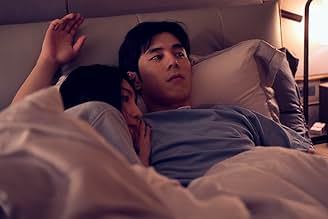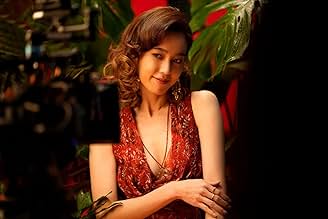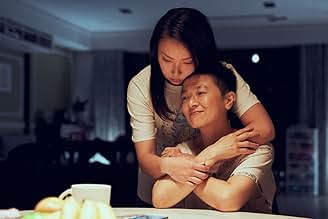VALUTAZIONE IMDb
7,8/10
623
LA TUA VALUTAZIONE
Niente può ferire l'amicizia tra Hsueh Ya-chi e Chou Fan, finché Ya-chi non decide di sposare Lee Tzu-chi. L'inaspettato matrimonio crea una frattura tra le due attrici, che diventano rivali... Leggi tuttoNiente può ferire l'amicizia tra Hsueh Ya-chi e Chou Fan, finché Ya-chi non decide di sposare Lee Tzu-chi. L'inaspettato matrimonio crea una frattura tra le due attrici, che diventano rivali e fonte di foraggio per la stampa.Niente può ferire l'amicizia tra Hsueh Ya-chi e Chou Fan, finché Ya-chi non decide di sposare Lee Tzu-chi. L'inaspettato matrimonio crea una frattura tra le due attrici, che diventano rivali e fonte di foraggio per la stampa.
Sfoglia gli episodi
Recensioni in evidenza
This drama is a difficult watch. It is primarily due to poor and unnatural acting from these Taiwanese actors and actresses. The performances lack balance and nuance, which makes it hard to connect with the characters or their emotions. When the scene calls for subtlety, the acting comes across as overly dramatic and exaggerated, making it feel unnatural. On the other hand, when there's supposed to be a climactic emotional outburst, the actors fail to deliver the intensity needed, leaving those moments feeling hollow and unconvincing. Overall, the inconsistent delivery takes away from what could have been a compelling story.
I loved this series from start to finish. Agreed, the acting is a bit unequal, some editing was sometimes a bit of a patchwork... but at the end it didn't matter much for me. I liked the authenticity of the story, the script is clever and sensitive.
Some themes are recurring in the plot: The difficulty of finding your place for an actress past a certain age.
How the friendship between two women can be intense but also break so easily.
How people can stay unhappy by always repeating the same behavior.
At the end, Ya-chih is perhaps the most mature character, but at which price? She rejects her closest partners (Chou Fan, and later her husband) at the first faux-pas.
At the end, who is wrong, who is right, who is happy? Give us more of this please.
Some themes are recurring in the plot: The difficulty of finding your place for an actress past a certain age.
How the friendship between two women can be intense but also break so easily.
How people can stay unhappy by always repeating the same behavior.
At the end, Ya-chih is perhaps the most mature character, but at which price? She rejects her closest partners (Chou Fan, and later her husband) at the first faux-pas.
At the end, who is wrong, who is right, who is happy? Give us more of this please.
This isn't a tragic drama, but I found myself crying until I got a migraine. In fact, I'm typing this while battling a searing migraine. In brief, I recommend this drama.
The strongest point in this drama is how the characters are brought to life by brilliant actors. It starts out a little slow, with the introduction of the characters but later picks up pace. The plot definitely encourages curiosity in the viewer about the personalities of characters and how their plot lines may develop, and I was not disappointed. The happiness, sorrows, passion and desperation of the characters was wonderfully portrayed. There's not actually much I can add because while the story itself is not particularly riveting or extraordinary, it's just been executed very well. In fact, the romance lines flowed very naturally as well.
The strongest point in this drama is how the characters are brought to life by brilliant actors. It starts out a little slow, with the introduction of the characters but later picks up pace. The plot definitely encourages curiosity in the viewer about the personalities of characters and how their plot lines may develop, and I was not disappointed. The happiness, sorrows, passion and desperation of the characters was wonderfully portrayed. There's not actually much I can add because while the story itself is not particularly riveting or extraordinary, it's just been executed very well. In fact, the romance lines flowed very naturally as well.
If you compare it to other Taiwanese shows, I guess this one is pretty good in terms of scriptwriting-probably the best they can achieve. However, compared to Netflix shows, which operate on a global level, it's a joke, especially in terms of acting. I watched a summary of the show, which led me to give it a try, but I couldn't even get through the first 3 minutes. The acting is way too exaggerated, and if this is the standard for actors in Taiwan, I'm honestly not surprised. While people in Taiwan praise this show a lot, it makes me wonder if they are simply blindsided by the production due to societal and political correctness or expectations. It feels like low expectations lead to high satisfaction-perhaps even an overly unrealistic level of satisfaction.
Born for the Spotlight leads viewers into the intricate friendship between two top actresses-Hsueh Ya-chih and Chou Fan-set against the fiercely competitive and alluring backdrop of the entertainment industry. While the drama boasts stellar performances and a fair amount of emotional tension, the overall narrative falls short of expectations. Despite its wealth of potential and richly layered characters, the series bites off more than it can chew, failing to fully flesh out the unique charm of each storyline. Ultimately, the result is a plot that feels scattered and incomplete.
The core conflict in Born for the Spotlight has plenty of room for development: the friendship between Hsueh Ya-chih and Chou Fan, once inseparable, begins to fray after Hsueh's unexpected marriage, which eventually turns the two into rivals. This premise holds immense emotional depth, with the potential to explore the complexities of relationships, competition, and betrayal in the entertainment world. However, the series doesn't focus its energy on carefully crafting this pivotal relationship. Instead, it jumps between different characters and subplots, leaving the main conflict feeling underdeveloped and lacking the depth it deserves.
Take the rift between Hsueh and Chou, for instance. Their fractured friendship should have been the emotional anchor of the entire series, but the show struggles to convincingly portray the nuances of their relationship's transformation. The abrupt shift following Hsueh's marriage feels forced, and viewers are left questioning why such a life event would so drastically alter their bond. The emotional buildup is too thin, robbing the story of the impact it could have had.
Additionally, the subplot surrounding rising star Emma Shih, a young actress striving to make her mark in the industry, feels underwhelming. As a 20-year-old with big dreams, Emma's journey could have offered a compelling contrast to the established actresses, adding layers of drama and tension. Yet, her path to stardom lacks real surprises or depth, rendering her more of a passive observer rather than an integral part of the narrative.
Despite these shortcomings, Born for the Spotlight does manage to create characters brimming with charm and complexity. Hsueh, Chou, and even Emma all possess intriguing personal stories, each with their own unique allure. Hsueh's resilience, Chou's mix of vulnerability and power, and Emma's youthful ambition-these characters offer rich material that could have been deeply explored.
The performances of the actors, in particular, breathe life into these characters, adding layers of subtlety to their emotions. The on-screen chemistry between Hsueh and Chou, whether in their moments of closeness or conflict, pulls the audience into their emotional struggles. Their performances elevate the material, making up for some of the narrative's shortcomings by giving the characters a tangible sense of humanity.
However, the show's ambition to juggle multiple storylines ultimately works against it. By trying to tell too many stories at once, the series dilutes the impact of each character's arc. If the focus had been on just one or two central figures, the emotional depth and dramatic tension could have been significantly stronger. As it stands, every storyline feels only halfway realized, preventing viewers from fully engaging with the characters' journeys.
It's easy to imagine how this series could have flourished if it had been divided into multiple seasons. Each season could have focused on different characters, allowing their stories to unfold at a more natural pace. The first season, for example, might have concentrated on Hsueh and Chou's friendship, tracing the rise and fall of their bond with more nuance and detail. The second season could have explored Chou's internal battles as she navigates the ruthless industry, while a third season could have spotlighted Emma's rise, contrasting her youthful idealism with the seasoned veterans. Such an approach would have given each character the attention they deserve, creating a richer, more immersive narrative.
In the end, Born for the Spotlight is a series brimming with untapped potential. It offers a cast of characters who are each fascinating in their own right, but it spreads itself too thin by trying to tell too many stories at once. If the show had chosen to focus more intently on one or two characters, or if it had been structured across multiple seasons, it might have delivered a more powerful and cohesive viewing experience. Even so, the standout performances and the intriguing, though underdeveloped, characters are enough to provide some enjoyment for viewers looking for a glimpse into the glamorous yet cutthroat world of showbiz.
The core conflict in Born for the Spotlight has plenty of room for development: the friendship between Hsueh Ya-chih and Chou Fan, once inseparable, begins to fray after Hsueh's unexpected marriage, which eventually turns the two into rivals. This premise holds immense emotional depth, with the potential to explore the complexities of relationships, competition, and betrayal in the entertainment world. However, the series doesn't focus its energy on carefully crafting this pivotal relationship. Instead, it jumps between different characters and subplots, leaving the main conflict feeling underdeveloped and lacking the depth it deserves.
Take the rift between Hsueh and Chou, for instance. Their fractured friendship should have been the emotional anchor of the entire series, but the show struggles to convincingly portray the nuances of their relationship's transformation. The abrupt shift following Hsueh's marriage feels forced, and viewers are left questioning why such a life event would so drastically alter their bond. The emotional buildup is too thin, robbing the story of the impact it could have had.
Additionally, the subplot surrounding rising star Emma Shih, a young actress striving to make her mark in the industry, feels underwhelming. As a 20-year-old with big dreams, Emma's journey could have offered a compelling contrast to the established actresses, adding layers of drama and tension. Yet, her path to stardom lacks real surprises or depth, rendering her more of a passive observer rather than an integral part of the narrative.
Despite these shortcomings, Born for the Spotlight does manage to create characters brimming with charm and complexity. Hsueh, Chou, and even Emma all possess intriguing personal stories, each with their own unique allure. Hsueh's resilience, Chou's mix of vulnerability and power, and Emma's youthful ambition-these characters offer rich material that could have been deeply explored.
The performances of the actors, in particular, breathe life into these characters, adding layers of subtlety to their emotions. The on-screen chemistry between Hsueh and Chou, whether in their moments of closeness or conflict, pulls the audience into their emotional struggles. Their performances elevate the material, making up for some of the narrative's shortcomings by giving the characters a tangible sense of humanity.
However, the show's ambition to juggle multiple storylines ultimately works against it. By trying to tell too many stories at once, the series dilutes the impact of each character's arc. If the focus had been on just one or two central figures, the emotional depth and dramatic tension could have been significantly stronger. As it stands, every storyline feels only halfway realized, preventing viewers from fully engaging with the characters' journeys.
It's easy to imagine how this series could have flourished if it had been divided into multiple seasons. Each season could have focused on different characters, allowing their stories to unfold at a more natural pace. The first season, for example, might have concentrated on Hsueh and Chou's friendship, tracing the rise and fall of their bond with more nuance and detail. The second season could have explored Chou's internal battles as she navigates the ruthless industry, while a third season could have spotlighted Emma's rise, contrasting her youthful idealism with the seasoned veterans. Such an approach would have given each character the attention they deserve, creating a richer, more immersive narrative.
In the end, Born for the Spotlight is a series brimming with untapped potential. It offers a cast of characters who are each fascinating in their own right, but it spreads itself too thin by trying to tell too many stories at once. If the show had chosen to focus more intently on one or two characters, or if it had been structured across multiple seasons, it might have delivered a more powerful and cohesive viewing experience. Even so, the standout performances and the intriguing, though underdeveloped, characters are enough to provide some enjoyment for viewers looking for a glimpse into the glamorous yet cutthroat world of showbiz.
I più visti
Accedi per valutare e creare un elenco di titoli salvati per ottenere consigli personalizzati
Dettagli
- Tempo di esecuzione1 ora
- Colore
- Mix di suoni
Contribuisci a questa pagina
Suggerisci una modifica o aggiungi i contenuti mancanti

Divario superiore
What is the French language plot outline for Born for the Spotlight (2024)?
Rispondi

































